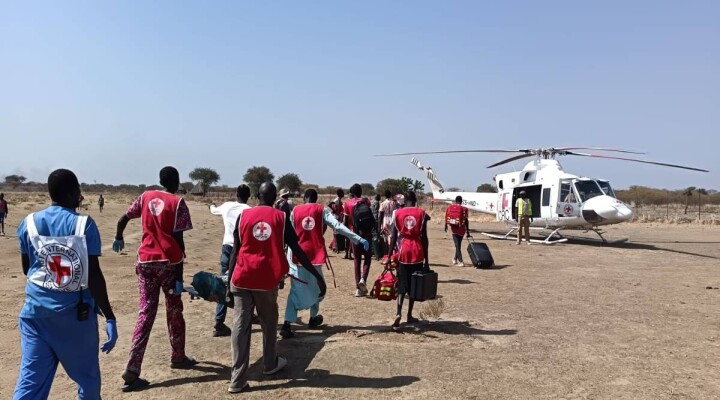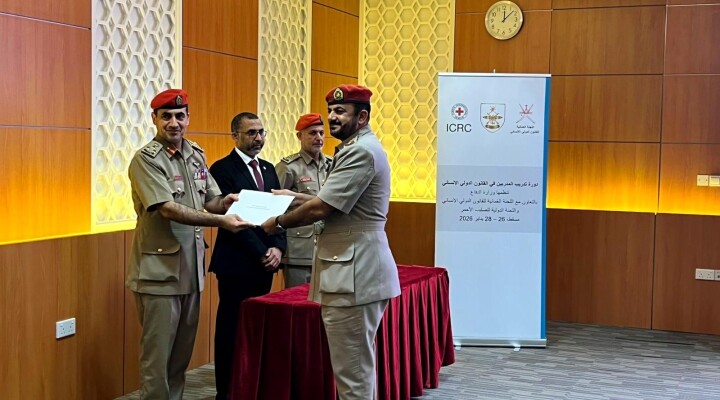Majority of millennials see catastrophic war as real possibility
EMBARGO until 16 January 12h30 GMT
As the collective memory of the 20th century’s two world wars fades, what do millennials think about war? How much do they know about the international laws and conventions designed to protect civilians and prohibit atrocities? And do they think these laws are even worthwhile?
To find out, the International Committee of the Red Cross (ICRC) surveyed over 16,000 young adults aged between 20 and 35 in 16 different countries and territories, some of them at peace, some of them in conflict.
The result is a fascinating picture of a generation with widely different views, and varying levels of knowledge about international law. But the survey also shows a generation united by concern over multiple global challenges, including conflict, climate change, and economic inequality.
This video news release from the ICRC includes short interviews with young people from Nigeria, Britain, Switzerland, the United States, Israel, and the occupied Palestinian territories. Asked if they thought a third world war was likely in their lifetimes, many expressed the hope that this would not happen, but the fear that it would. “It seems like it might be going that way,” said one young man from London.
Others suggested a global conflict was already underway, but in a different form from the wars of the 20th century. “There’s already a war happening, between the rich and the poor,” suggested a young Nigerian woman. And another young woman from Switzerland added that she thought if there was a third world war, it would be very different. “More biological warfare, or cyber attacks.”
But while fearing the prospect of unconventional warfare or even the use of illegal weapons, nearly all the millennials interviewed agreed that there should be rules for war. “I think it’s extremely important to have some rules surrounding war,” said a young woman from London. “There has to be something in place to protect civilians so we can’t just press a button and you’ve lost a whole culture and people and history.”
Others were more specific about international law. “No matter which war you are in, people should get medical aid,” said a young man from the United States. “Regardless of which parties they belong to, because there are some humanitarian standards that we have to uphold.”
“The Geneva Conventions are crucial for the protection of civilians in armed conflict,” added a young man from Palestine. “Because they restrict the effects of wars.”
But when interviewees were asked specifically about whether the use of torture was ever permissible, the answers were more mixed. While many agreed that torture should never be used, some suggested there could be circumstances where it might be justified. “If the results of torture help solve or prevent something then I guess it’s actually good,” said a young man from the United Kingdom. “In general principle no, but I can see why it’s used.”
“As much as I’d love to say no”, added a young woman from London. “I think if you know someone has done something terrible and they’ve inflicted pain on someone…they should suffer as well.”
Millennials actually living in conflict zones however were virtually unanimous in their opinion that torture was always wrong. “It is never acceptable”, said a young man from occupied Palestinian territories. “Torture is an inhumane act, and it’s unfair to torture a human being, whatever the circumstances.” “It is not acceptable,” added a man from Nigeria. “It is inhuman, it is barbaric. It is not acceptable in any society.”
So how do these young people see the future? Their views are a mixture of optimism, aspiration, and trepidation. A young woman from the United States said she found hope from her own generation. “The young people, organizing and speaking out, with their energy and commitment.” Another, from Nigeria, said she was dismayed to be even talking about the chances of war. “Making people suffer all over again, and it’s what, 2020? Things are supposed to be getting better right, instead of getting worse.” “We are the people that are going to be inheriting the world,” said a young American woman. “And as we see this older generation stepping out of power, and a new generation coming in, I think we see that these people have different values, they have different morals, and they have a different view of the world. Who knows whether we will be successful or not, but I think that we are putting the right foot forward.”
KEY FACTS
The ICRC surveyed over 16,000 people aged between 20 and 36 in 16 countries and territories
47% thought it was likely they would experience a third world war during their lifetime
74% believed wars were avoidable
84% believed the use of nuclear weapons was never acceptable
75% agreed that wars should have rules
37% believed torture was justified in some circumstances
For further information please contact:
Anita Dullard, +41 79 574 1554, adullard@icrc.org
SHOTLIST
0:00 – 0:44 Various, Syria, destruction (drone footage)
Vox Pops on likelihood of war
0:44 – 0:54 Young man UK ‘Do I think a third world war is likely in my lifetime? I hope not. But, it seems like it might be going that way.’
0:54 – 1:03 Young woman Nigeria. ‘I don’t really think about that because to me I think there is already a war happening. Between the rich and the poor.’
1:03 – 1:16 Young woman Switzerland (French original) ‘A third world war? I really hope not. And I think perhaps not. Yes there are risks of conflict, but I hope we would be able to stop them.’
1:16 – 1:24 Young woman United States ‘I really think that diplomacy is something that we should focus more on as country versus just being like OK war is the solution.’
1:24 – 1:36 Young woman Switzerland (French original) ‘Honestly if we have a third world war I don’t think it will be like the earlier ones. There will be more biological warfare, or cyber attacks.’
1:36 – 1:45 Young man Nigeria ‘Nobody wants to go to war. It costs to go to war. So I don’t think a third world war is going to happen.’
1:45 – 1:57 Young man Switzerland (French original) ‘I think we are already in world war three. An economic world war. Look at the world leaders. The United States, China, Russia.’
1:57 – 3:31 Various general shots of war, Yemen, Iraq, Syria
Vox pops on rules of war
3:31 – 4:02 Young woman UK ‘I think it’s extremely important to have some rules surrounding war. There has to be something in place to protect civilians so we can’t just press a button and you’ve lost a whole culture and people and history and country. It would be extremely sad.’
4:02 – 4:20 Young man Switzerland ‘I think it is really important that we impose laws and have clear sanctions towards crimes in war. And I think it is really important to make sure that even if warfare needs to be an option, there should be a clear rule of conduct.’
4:20 – 4:34 Young man US ‘No matter which war you are in, people should get medical aid. Regardless of which parties they belong to, because there are some humanitarian standards that we have to uphold.’
4:34 – 4:42 Young woman Switzerland ‘I know what the Geneva conventions are actually. It’s the ones that say you can’t just act like this in war, you have to have some rules and stuff like this.’
4:42 – 4:55 Young man, OPT (original Arabic) ‘The Geneva Conventions are crucial for the protection of civilians in armed conflict. Because they restrict the effects of wars.
4:55 – 5:00 Young woman US ‘I believe wars should have limits, if they have to exist at all then there should be some type of limitation.’
5:00 – 5:09 Young woman US ‘Hmm, I don’t know, I feel that’s kind of the point of war is that, it’s like, no bars held.’
5:09 – 5:13 Young woman US ‘I don’t believe in war but if we must have it there most definitely need to be limitations.’
5:13 – 5:23 Young woman OPT (Original Arabic) ‘We should abide by the Geneva Conventions. They provide protection or civilians in war.’
5:23 – 6:03 Various shots warfare, Iraq,
Vox pops on acceptability of torture
6:03 – 6:11 Young woman, UK ‘No I don’t think torture is acceptable for any reason. To torture people I think that is just inhuman.’
6:11 – 6:29 Young man, UK ‘If the results of torture help solve or help prevent something, and this can be properly organized, then I guess, in retrospect, it’s actually good. But, in general principle no, but I can see why it’s used.’
6:29 – 6:41 Young man, OPT (Original Arabic) ‘It is never acceptable. Torture is an inhumane act, and it’s unfair to torture a human being, whatever the circumstances.’
6:41 – 6:51 Young woman, Switzerland ‘Torture? I think it’s not a reliable way to get information and it just creates lots and lots of absolutely unnecessary suffering.’
6:51 – 7:03 Young woman, Nigeria ‘To me, it’s not in human nature to torture. So it’s like a no no for me. That’s my opinion anyway.’
7:03 – 7:33 Young woman, UK ‘This is a really hard question and I have surprised myself having to think about this one, whether torture is ever acceptable in any form. I think, as much as I’d love to say no it’s not, I think if you know someone has done something terrible and they’ve inflicted pain on someone and they’ve done the most horrendous things, I lean towards the side of, they should suffer as well.
7:33 – 7:44 Young woman, OPT (Original Arabic) ‘No, never. Torture is never acceptable because it violates every human right.’
7:44 – 7:54 Young man, Switzerland ‘Even if they are criminals, the should be treated fairly and be judged fairly for their crimes, but not be tortured.’
7:54 – 8:06 Young man, Nigeria ‘It is not acceptable. It is inhuman, it is barbaric. So it is not acceptable anywhere, it is not acceptable in any society.’
8:06 – 8:39 Various general shots, Yemen civilians suffering in war
Vox pops about the future
8:39 – 8:55 Young woman, United States ‘We are the people that are going to be inheriting the world. And as we see this older generation stepping out of power, and a new generation coming in, I think we see that these people have different values, they have different morals, and they have a different view of the world. Who knows whether we will be successful or not, but I think that we are putting the right foot forward.’
8:55 – 9:15 Young woman, Nigeria ‘How do you want to start a war again? Bomb the whole country, let us know we are all going to die? Making people suffer all over again, and it’s what, 2020? Things are supposed to be getting better right, instead of getting worse.’
9:15 – 9:25 Young woman, United States ‘The young people, organizing and speaking out, with their energy and commitment.’
9:25 – 9:56 Various general shots Iraq, more hopeful, civilians in conflict zones.



